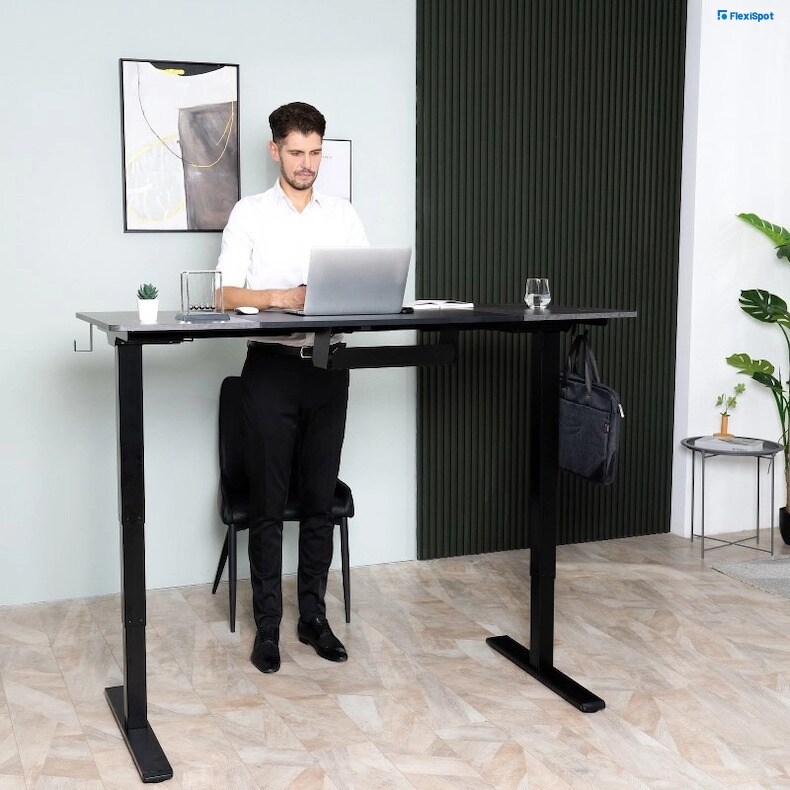The rise of remote work has brought about many benefits, including increased flexibility and convenience. However, it also poses a new set of challenges, such as the potential for body pain caused by extended periods of sitting. Neck, back, and butt pain are common issues faced by those who work from home, but there are ways to prevent them. In this article, we will discuss some effective tips to help you prevent body pain while working at home.

Invest in ergonomic furniture
The first step to prevent body pain is to invest in ergonomic furniture. This includes an ergonomic chair, desk, and keyboard. An ergonomic chair provides proper support for your back, while an adjustable desk allows you to set the height of your workspace to match your body's proportions. An ergonomic keyboard can also help prevent wrist and hand pain.
Recommended product:
Pro Standing Desk (E5)
Improved motor technology is used in the FlexiSpot E5 to make it more user-friendly. In essence, its dual-motor lifting system and double crossbeam structure work together to ensure a stable experience and easier operation.
There is no need to be concerned about its stability because it can support up to 220 pounds of weight without sagging or wobbling, both at its tallest position and while being moved.
A sit-stand reminder that lets you set a timer from 0 to 99 minutes, an advanced keypad panel with three height presets, and an anti-collision feature that prevents movement when impediments are met are all included in this device. This desk's height ranges from 24.4 to 50 inches, making it suitable for users from 4'6" to 6’7".
Take frequent breaks
Sitting for extended periods can cause strain on the neck, back, and buttocks. Taking frequent breaks can help alleviate this strain. Experts recommend taking a break every 30 minutes to stretch and move around. This can be as simple as standing up and walking around your workspace, doing some light exercises or stretches, or taking a short walk outside.

Stretching exercises
Stretching is a great way to prevent body pain. Regular stretching can help improve flexibility, increase blood flow, and reduce muscle tension. There are many stretching exercises that you can do at home. Some examples include neck rolls, shoulder shrugs, back extensions, and buttock stretches.
Maintain good posture
Maintaining good posture is essential to prevent body pain. Sitting with your back straight, shoulders relaxed, and feet flat on the floor can help prevent neck, back, and butt pain. You should also make sure your monitor is at eye level, and your keyboard and mouse are within easy reach. Avoid hunching over your computer or slouching in your chair.

Use a standing desk
A standing desk is a great option for those who want to avoid sitting for extended periods. Standing desks allow you to work in a standing position, which can help improve circulation and reduce the risk of back pain. However, it is important to use a standing desk correctly. Experts recommend alternating between standing and sitting every 30 minutes to prevent fatigue and strain.
Use a footrest
Using a footrest can help improve your posture and reduce the risk of back pain. A footrest can help elevate your feet to the correct height, which can help reduce pressure on your lower back. It is important to choose a footrest that is adjustable to match your height and posture.

Use a lumbar support pillow
A lumbar support pillow can help reduce the strain on your lower back. A lumbar support pillow is designed to support the natural curve of your spine, which can help prevent back pain. It is important to choose a lumbar support pillow that is the correct size for your body and fits snugly against your back.
Stay hydrated
Staying hydrated is important to prevent body pain. Drinking plenty of water throughout the day can help keep your joints and muscles lubricated, which can help reduce the risk of pain and stiffness. It is recommended that you drink at least eight glasses of water per day.

Take care of your eyes
Working at a computer for extended periods can cause eye strain, which can lead to headaches and neck pain. To prevent this, it is important to take care of your eyes. Experts recommend following the 20-20-20 rule: every 20 minutes, take a 20-second break, and look at something 20 feet away.
Get a good night's sleep
Getting a good night's sleep is essential to prevent body pain. Lack of sleep can cause muscle tension and stiffness, which can lead to muscle tension during the day. Make sure you get the right amount of sleep every night.
Working with body pain can have serious consequences on your overall health and well-being. When we experience pain, it is our body's way of communicating that something is wrong. Ignoring these signals and continuing to work through the pain can lead to further damage, and in some cases, chronic conditions.

Let's take a look at some of the potential consequences of working with body pain:
Increased pain and discomfort: Working through pain can exacerbate the symptoms and make them worse. This can lead to increased pain, stiffness, and discomfort.
Decreased productivity: When you are in pain, it can be difficult to focus on your work, leading to decreased productivity and efficiency. This can have a negative impact on your work performance and may even affect your job security.
Mental health issues: Chronic pain can lead to anxiety, depression, and other mental health issues. When pain persists, it can be challenging to maintain a positive outlook and may impact your overall quality of life.
Decreased mobility: If you continue to work through the pain, you may be putting strain on your muscles and joints. Over time, this can lead to decreased mobility and range of motion, making it more challenging to perform everyday tasks.
Chronic conditions: If you ignore your body's warning signs and continue to work through the pain, you may be at risk for developing chronic conditions such as carpal tunnel syndrome, tendinitis, or even herniated discs. These conditions can be painful, difficult to treat, and may require extensive medical intervention.
It's essential to take care of your body and listen to its signals. Continuing to work through pain can have serious consequences on your health and well-being. If you are experiencing pain or discomfort while working, it's essential to take action to address the underlying issue and prevent further damage.
